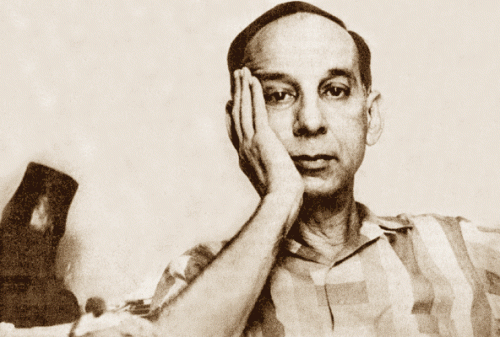Virgilio Piñera
by Horacio Castellanos Moya / August 30, 2012 / No comments
Cuba celebrates a writer it once imprisoned
When a writer is described as “marginal” several scenarios come to mind. It might refer to someone whose work hasn’t been well received or hasn’t been published at all. Or it could mean a writer who hasn’t succeeded in finding his or her place in public life or the institutional sphere, or one who has no interest in doing so. But in any case, this is a writer who remains on the margins.

- Corkscrew is focused on Latin American issues. Literature, journalism and politics are the main concerns of this column. A corkscrew is useful only if it opens a bottle, hopefully full of something that would enlighten our spirits, but we could also set loose a cruel Genie or a rotten wine. The author will follow this principle: look for topics that open debates, new perspectives, and controversy. Cheers!

- Horacio Castellanos Moya is a writer and a journalist from El Salvador. For two decades he worked as a journalist in Mexico, Guatemala, and his own country. He has published ten novels, five short story collections and two books of essays. He was granted residencies in a program supported by the Frankfurt International Book Fair (2004-2006) and at City of Asylum/Pittsburgh (2006-2008). In 2009, he was a guest researcher at the University of Tokyo. Currently he teaches at the University of Iowa.
I’ve been thinking about this idea of marginality due to the one-hundredth anniversary of the birth of the great Cuban writer Virgilio Piñera, who was born in Cárdenas on August 4, 1912 and died in Havana on October 18, 1979. The Centennial of Piñera, whose work included plays, short stories, poetry, novels, and essays, is being celebrated throughout Cuba with series of international colloquia, dance and theater festivals, and concerts. The Cuban government, which jailed Piñera in 1961 on charges of “pederasty” and later ostracized him, has declared 2012 “El Año Virgiliano” (The Year of Virgilio). (An enlightening article on the Cuban government’s official appropriation of Piñera, written by historian Rafael Rojas with a suggestive title taken from Polish Nobel Prize winner Czeslaw Milosz, can be read here.)
I would like to write a portrait of Piñera, beginning with the publication of his debut book of poetry Las furias (The Furies) in 1941, and his contentious relationship with the poet José Lezama Lima at the literary magazine Orígenes. Next would be his twelve-year exile in Buenos Aires, where he shared a life of poverty and illusions with another distinguished Polish writer, Witold Gombrowicz, a marginal figure of the same stripe, and where he published his collection Cuentos fríos (Cold Tales), a set of Kafkaesque stories published before Kafka was translated into Spanish. Then I’d include his return to Havana from exile in 1958, just as Fidel Castro and his bearded revolutionaries were on the verge of taking power. Finally I would describe how his early enthusiasm turned to fear when the Revolution veered toward Stalinism, and how in the last part of his life he was imprisoned and marginalized because of his homosexuality. But so much for my plans. As it turns out, Piñera has already been portrayed with firsthand knowledge, lucidity, enormous admiration, and affection by, Guillermo Cabrera Infante, in a chapter from his book Mea Cuba.
Piñera was a marginal writer, but not because his work wasn’t recognized during his lifetime. He was marginal because he preferred to remain on the sidelines, far away from those in power. He lived a life of hand-to-mouth poverty in rented rooms in shadowy boarding houses, on starvation wages earned from doing odd jobs. The intricate courtly dance of flattery and falseness performed by writer-bureaucrats (writers aligned with the government/writers dependent on the government) was foreign to him. He even found his paid lovers in ordinary walks of life: porters from the market, bus drivers, and sailors. By principle, he kept away from writers and intellectuals.
However his private life is only an anecdote. The important thing is that he left behind an enduring body of work. In his plays and his fiction, he returned time and again to the absurdity of existence and the complexities of the human psyche, emotions, and relationships. He was one of the pioneers of the literature of the absurd. And he pulled no punches. His work openly addressed the cruelty residing in the human heart, a cruelty that’s sometimes hidden from view but is always poised to attack a fellow human being.
Overall, Piñera was best known for his plays. I remember seeing a production of Dos viejos pánicos (Two Old Men in a Panic) in San Salvador a few years before the outbreak of the Salvadoran Civil War. Still, for me, Piñera’s most dazzling work has always been his narrative prose. His book of short stories Un fogonazo (A Flash) and his novel Pequeñas maniobras (Small Maneuvers), though a little hard to find, are gems of Latin American fiction.
Translation: Sam Cogdell and Maya Novák-Cogdell





